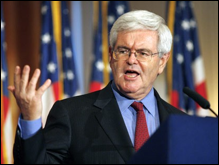 Former Speaker of the House Newt Gingrich has supported—along with over 80 percent of the American public—the Employee Rights Act for some time. He recently restated his support for this package of labor reforms in an opinion piece that has run in numerous outlets, including the Pittsburgh Tribune-Review, the Detroit News, the Tampa Tribune, the Salt Lake Tribune, and the Des Moines Register. The former Speaker writes:
Former Speaker of the House Newt Gingrich has supported—along with over 80 percent of the American public—the Employee Rights Act for some time. He recently restated his support for this package of labor reforms in an opinion piece that has run in numerous outlets, including the Pittsburgh Tribune-Review, the Detroit News, the Tampa Tribune, the Salt Lake Tribune, and the Des Moines Register. The former Speaker writes:
For months, we have been bombarded with them every time we turn on our televisions, computer screens and car radios. One group of Americans is especially happy: union members. Millions of them were forced to fund political ads through their union dues, even if they opposed the candidates that their money supported.
That’s because political spending by union leadership is far more lopsided than the ideological makeup of the unions in general. Election exit polls indicated that 38 percent of voters from union households voted for Republican representatives while 60 percent voted for Democrats. Compare that to the political contributions by the unions themselves. According to data from OpenSecrets and FollowTheMoney, nearly 90 percent of union contributions went to Democrats in 2014.
One Register reader did not like this fair proposal, and drew a false equivalence to attack it. The letter argues:
If we were to follow [Gingrich’s] line of reasoning, it is only logical that corporations’ PACs should also get explicit permission from stockholders before they spend corporation funds on political purposes.
Like the New York Times, which also recently tripped over itself trying to excuse Big Labor’s political expenditures while condemning businesses’, the writer falls victim to misconceptions about how companies and labor unions fund politics.
First of all, both corporate and labor candidate PAC contributions are required to be opt-in from a “separate segregated fund,” at least for federal elections.
Additionally, the supposed equivalence between stockholders and employees isn’t really an equivalence at all. Shareholders who don’t like what a company does with its money can sell their shares quite easily (hundreds of millions of shares in U.S. companies are sold or traded each day). Many unionized employees have much less flexibility. Under current law, employees in many states who don’t want to fund liberal organizations like Media Matters Action Network, the Center for American Progress, or Planned Parenthood Action Fund have to go through an onerous court-ordered opt-out procedure that requires them to forfeit workplace rights, or they must change jobs. When 38 percent of union households are casting ballots for Republicans for the House of Representatives, unions’ overwhelming backing of liberal institutions is certain to grate on a significant block of members and potential members.



